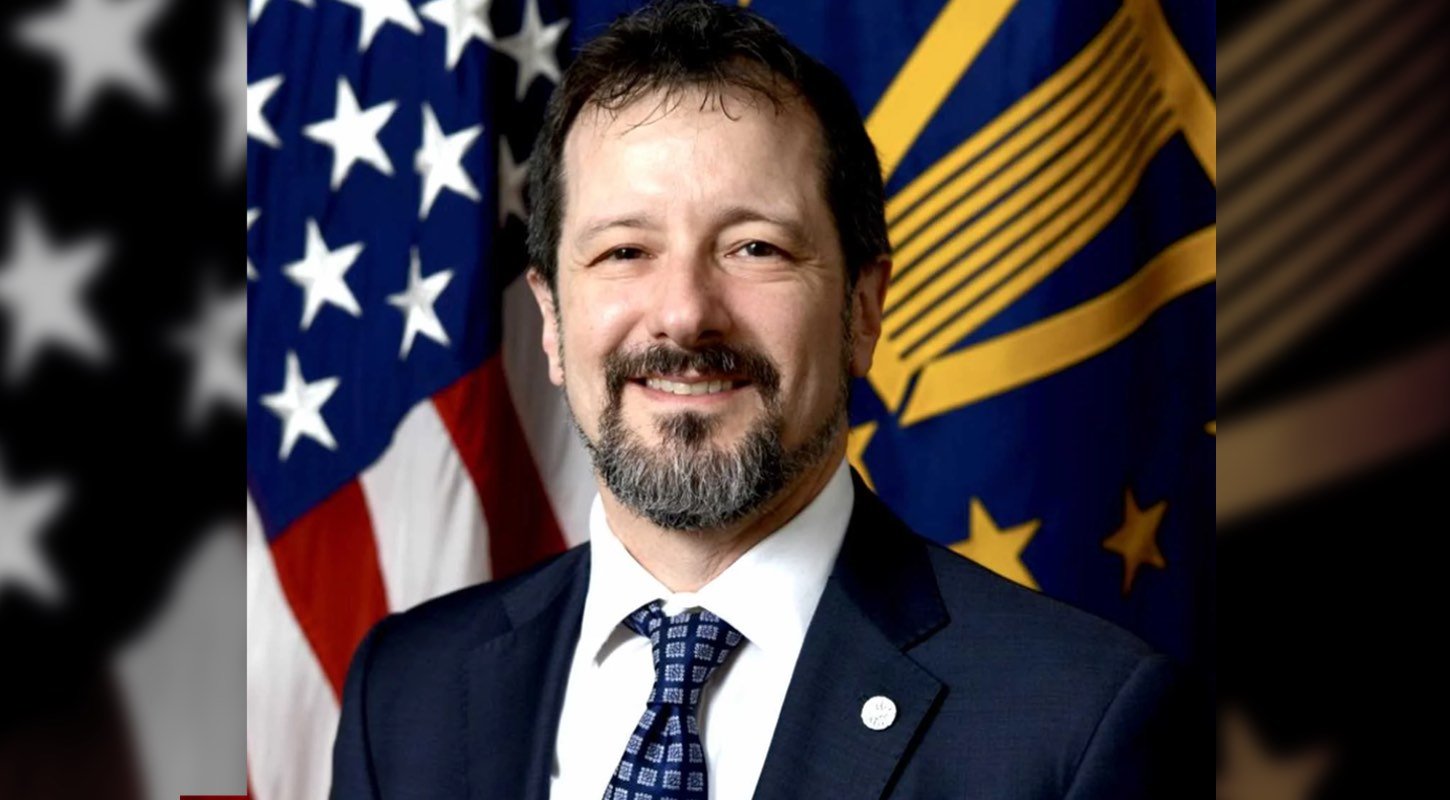The Department of Defense (DoD) has confirmed that the scientist currently leading its investigations into sightings of unidentified anomalous phenomena (UAP) reported by military personnel will be retiring before the end of the year.
Dr. Sean Kirkpatrick, who has led the Pentagon’s All-Domain Anomaly Resolution Office (AARO) since it was officially launched last July following enactment of the FY 2022 National Defense Authorization Act (NDAA), has announced his plans to leave the position in December.
Kirkpatrick’s plans for departure, confirmed by Politico on Tuesday, were officially announced Wednesday morning in a statement issued by Deputy Secretary of Defense Kathleen Hicks, although speculations about his departure had already been in circulation beforehand.
“During his distinguished 27-year career of public service in the Department of Defense and the United States Intelligence Community, and since assuming leadership of AARO, Dr. Kirkpatrick has served the American people with honesty and integrity, tackling an incredibly difficult mission to explain the unknown,” Hicks said on Wednesday.
Hicks, who had taken a more active role in coordinating with Kirkpatrick and AARO in recent months, praised Kirkpatrick for his efforts with AARO, during which he and his staff “investigated more than 800 unidentified anomalous phenomena (UAP) cases, led an extensive search for U.S. Government and contractor programs associated with UAP, and established the department’s first public-facing website,” which helped “bring greater transparency to the department’s work.”
Just hours after Hicks confirmed Kirkpatrick’s plans to leave, the DoD announced that Timothy A. Phillips had been officially selected to serve as AARO’s Deputy Director.
In May, The Debrief reported on an unclassified vacancy for the position, originally posted in late April, which detailed the responsibilities for the second-in-command position.
On Wednesday, the DoD said Phillips had officially arrived on assignment for the position.
“A member of the Senior National Intelligence Service since 2006, Phillips brings to AARO his extensive experience in geospatial intelligence collection and mission management, expertise that is critical to enabling DOD and intelligence community components to successfully identify, characterize, and resolve unidentified anomalous phenomena,” the Pentagon said.
On Tuesday, Kirkpatrick told Politico that Phillips would serve as interim director after his departure “until the Pentagon hires a permanent replacement.”
Kirkpatrick and AARO have received significant attention in recent months. Last month, the release of AARO’s 2023 Annual Report on UAP added a total of 291 new UAP reports to the collection of cases it is currently working to resolve.
Just last week, the Pentagon announced that a new secure reporting system had been established at AARO’s website for U.S. government personnel who may know about secret programs involving UAP.
Any reports AARO collects through the new secure mechanism, which imposes strict limitations on what can be submitted based on classification of the relevant information, “will be used to inform AARO’s congressionally directed Historical Record Report, due to Congress by June 2024, and its investigations into alleged U.S. government UAP programs.”
Despite the new secure reporting mechanism that was recently made available on AARO’s website, U.S. government personnel are being instructed not to submit sightings of UAP directly through AARO’s website and are instead advised to “follow the process established by your service branch or federal agency to report the information to AARO.”
Claims of secret government programs involved in the collection of information—and possibly even physical evidence of exotic technologies—associated with UAP have persisted for decades.
In June, The Debrief was the first to report on a complaint filed with the Intelligence Community Inspector General involving the alleged existence of a secret U.S. program claimed to have been involved in the acquisition of craft believed to be of non-human origin.
The complaint was filed by David Grusch, a former intelligence officer who worked with the National Geospatial-Intelligence Agency (NGA), serving as that agency’s liaison to AARO’s predecessor organization, the UAP Task Force, before he left government.
During a Congressional hearing in July, Grusch, along with former U.S. Navy fighter pilots David Fravor and Ryan Graves, testified under oath and told members of Congress that he had spoken with close to 40 individuals within the U.S. intelligence community with knowledge of the secretive UAP program.
Shortly after the hearing, Kirkpatrick wrote a statement that he shared on his LinkedIn page where he criticized several of the statements that had been made by the witnesses during the hearing.
“I cannot let yesterday’s hearing pass without sharing how insulting it was to the officers of the Department of Defense and Intelligence Community who chose to join AARO,” Kirkpatrick’s statement read.
“They are truth-seekers,” Kirkpatrick wrote of his staff in the statement, “as am I.”
“But you certainly would not get that impression from yesterday’s hearing,” Kirkpatrick added.
During a media roundtable on October 31, 2023, Kirkpatrick told reporters that since AARO had been established, Grusch had not yet visited him and his staff.
“Mr. Grusch, since AARO has stood up and since I’ve been director, has not come to see us and provided any information,” Kirkpatrick said during the off-camera media event. Asked if he had spoken with Grusch previously, Kirkpatrick acknowledged he had communicated with him in the past, but stated that it had likely been close to five years ago.
“So, the last time I believe I spoke with Mr. Grusch was when I was in the J2 at U.S. Space Command about five years ago,” Kirkpatrick said, adding that “it was not on this topic.”
Kirkpatrick added that he and his staff had interviewed “over 30 people now,” adding that he believed he and his staff had “interviewed most of the people that [Grusch] may have talked to, but we don’t know that.”
“And we have extended an invitation at least four or five times now for him to come in over the last eight months or so and [have] been declined,” Kirkpatrick also said.
Responding to a text message from NewsNation Senior National Correspondent Brian Entin, Grusch characterized Kirkpatrick’s statement as inaccurate.
“I have zero emails or calls from them,” Grusch was quoted saying of the alleged invitations from AARO Kirkpatrick referenced in the October 31 media roundtable.
“That is a lie,” Grusch added.
The announcement of Kirkpatrick’s planned departure from AARO next month comes amidst additional public criticism, which includes a Change.org petition calling for his removal.
Currently, there are no vacancies listed for the position of AARO Director on the website of the Director of National Intelligence.
However, Deputy Secretary of Defense Kathleen Hicks said on Wednesday that the Pentagon is currently coordinating with the Office of the Director of National Intelligence (ODNI) to select Kirkpatrick’s replacement.
Micah Hanks is the Editor-in-Chief and Co-Founder of The Debrief. He can be reached by email at micah@thedebrief.org. Follow his work at micahhanks.com and on Twitter: @MicahHanks.

